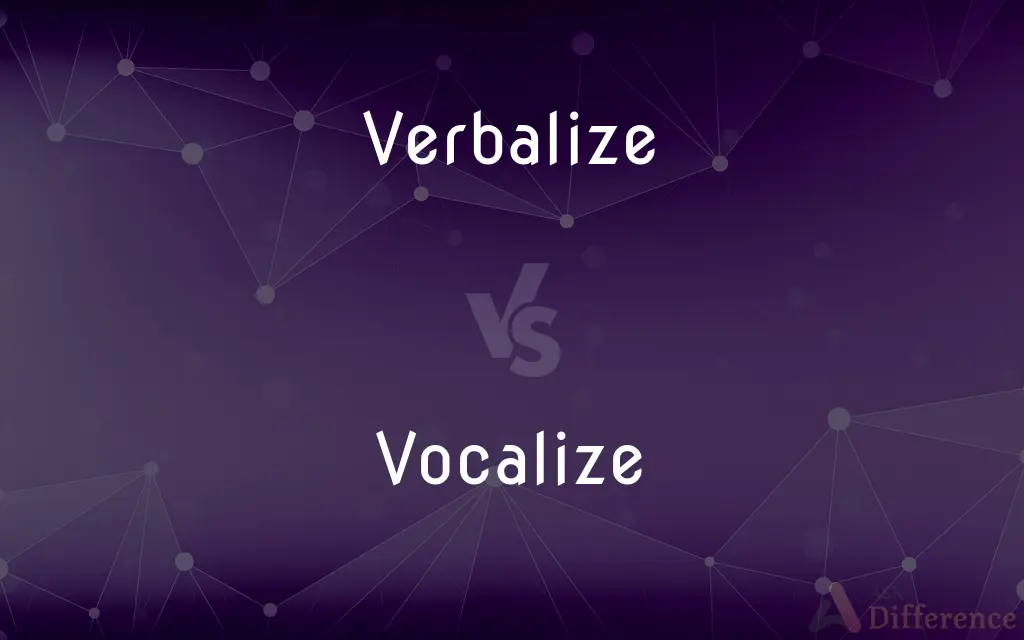Verbalize vs. Vocalize — What's the Difference?
By Tayyaba Rehman & Urooj Arif — Updated on April 20, 2024
Verbalize involves expressing thoughts or feelings in words, while vocalize refers to producing sounds with the voice, not necessarily words.

Difference Between Verbalize and Vocalize
Table of Contents
ADVERTISEMENT
Key Differences
Verbalize is the act of putting thoughts, feelings, or concepts into words, often to communicate more clearly with others. Whereas vocalize involves making any kind of sound using the voice, which may include musical tones or non-verbal sounds as well as words.
When someone verbalizes, they articulate ideas through spoken or written language, aiming for clarity and comprehension in communication. On the other hand, vocalizing can be as simple as humming, moaning, or making other vocal sounds that do not form coherent words.
Verbalization is crucial in contexts where explicit communication is needed, such as in teaching, therapy, or detailed discussions. Vocalization, however, can be used for emotional expression, as in singing or crying, where the intent is more about feeling than detailed communication.
In therapeutic or developmental settings, verbalizing helps individuals express their internal states and can be a tool for cognitive development and emotional management. Conversely, vocalization can be a fundamental developmental step in infants before they start speaking, and remains a part of how emotions are expressed throughout life.
The skills required for effective verbalization include a good vocabulary, understanding of syntax, and the ability to organize thoughts coherently. In contrast, vocalization primarily requires control over one's vocal cords and breathing, and may not involve any linguistic skills.
ADVERTISEMENT
Comparison Chart
Definition
Expressing thoughts or feelings in words.
Producing sounds with the voice, not necessarily words.
Primary Use
Communication of specific ideas and information.
Expression of emotion or basic communicative sounds.
Contexts
Teaching, therapy, discussions.
Singing, crying, animal sounds.
Required Skills
Vocabulary, syntax, organization of thoughts.
Control of vocal cords, breathing techniques.
Emotional Aspect
Can be used to convey or clarify emotional states.
Often directly expresses emotions.
Compare with Definitions
Verbalize
Involves using language to clarify, explain, or debate.
The debate required participants to verbalize their arguments effectively.
Vocalize
Also used to describe the action of making any vocal sound, including non-verbal ones.
She vocalized her pain with a sharp cry.
Verbalize
Can be applied in both spoken and written forms.
He was asked to verbalize his complaints in an email.
Vocalize
To produce sound using the voice, which may or may not form words.
The singer began to vocalize as she warmed up her voice.
Verbalize
Essential in academic and professional settings for clear communication.
The professor encouraged students to verbalize their questions clearly.
Vocalize
Can refer to the sounds made by animals.
The dog vocalized its distress through constant whining.
Verbalize
To express thoughts or feelings in words.
She needed to verbalize her frustration to make the team understand her perspective.
Vocalize
Includes making musical sounds as in singing or humming.
He would often vocalize melodies before putting lyrics to them.
Verbalize
Often used in a psychological context, encouraging clients to articulate their emotions.
The therapist asked him to verbalize what he felt during the incident.
Vocalize
Used in the context of speech development in young children.
The toddler began to vocalize long before he could speak actual words.
Verbalize
To express in words
Verbalized his displeasure.
Vocalize
To produce by using the vocal organs
"I said these things out loud, actually vocalized the words" (Joan Didion).
Verbalize
(Grammar) To convert to use as a verb
Verbalized the noun contact.
Vocalize
To give voice to; articulate
A poem that vocalizes popular sentiment.
Verbalize
To express oneself in words.
Vocalize
To mark (a vowelless Hebrew text, for example) with vowel points.
Verbalize
To be verbose.
Vocalize
To change (a consonant) into a vowel during articulation.
Verbalize
(transitive) To speak or to use words to express.
Bill became tongue-tied and could not verbalize his thoughts in the presence of the girl he had a crush on.
Vocalize
To voice.
Verbalize
To adapt (a word of another part of speech) as a verb.
Vocalize
To use the vocal organs to produce sounds
Birds that vocalize in flight.
Verbalize
To convert into a verb; to verbify.
Vocalize
To use another organ, such as a swim bladder, to produce sounds.
Verbalize
To express in words.
Vocalize
(Music) To sing.
Verbalize
To be verbose.
Vocalize
(Linguistics) To be changed into a vowel.
Verbalize
Be verbose;
This lawyer verbalizes and is rather tedious
Vocalize
To express with the voice, to utter.
Verbalize
Express in speech;
She talks a lot of nonsense
This depressed patient does not verbalize
Vocalize
(of animals) To produce noises or calls from the throat.
We could hear the monkeys vocalizing, though we could not see them.
Verbalize
Articulate; either verbally or with a cry, shout, or noise;
She expressed her anger
He uttered a curse
Vocalize
(music) To sing without using words.
Verbalize
Convert into a verb;
Many English nouns have become verbalized
Vocalize
(linguistics) To turn a consonant into a vowel.
Vocalize
To make a sound voiced rather than voiceless.
Vocalize
(linguistics) To add vowel points to a consonantal script (e.g. niqqud in Hebrew)
Vocalize
To form into voice; to make vocal or sonant; to give intonation or resonance to.
It is one thing to give an impulse to breath alone, another thing to vocalize that breath.
Vocalize
To practice singing on the vowel sounds.
Vocalize
Utter with vibrating vocal chords
Vocalize
Sing with one vowel
Vocalize
Pronounce as a vowel;
Between two consonants, this liquid is vowelized
Vocalize
Express or state clearly
Vocalize
Utter speech sounds
Common Curiosities
Why is it important to verbalize thoughts in therapy?
It helps in understanding and processing emotions and issues more effectively by articulating them.
Is singing considered vocalizing?
Yes, singing is a form of vocalizing that involves controlled pitch and rhythm.
How do animals vocalize?
Animals vocalize through various sounds like barks, meows, or chirps to communicate with each other or express emotions.
Can someone vocalize without speaking?
Yes, vocalizing includes any sound made with the voice, such as humming or moaning, which does not necessarily involve words.
What role does vocalization play in music?
It is central to singing and involves techniques related to pitch, volume, and tone control.
How do babies vocalize before they speak?
Babies vocalize through sounds like cooing and babbling as early forms of vocal development.
What techniques help with vocalization?
Techniques like breath control, vocal warm-ups, and phonetic exercises improve vocalization.
Are there exercises to improve verbalization?
Yes, exercises like reading aloud, vocabulary building, and practicing speech can improve verbalization.
Can vocalizing involve language?
Yes, vocalizing can involve language if the sounds form words, but it often includes non-verbal sounds.
What is the difference between verbalize and vocalize?
Verbalize is specifically about using words to express something, while vocalize can include any sound produced by the voice.
What does it mean to verbalize effectively?
It means to clearly and coherently express thoughts or feelings in spoken or written words.
Can verbalizing help in learning new languages?
Absolutely, actively using a new language in speech helps in quicker learning and retention.
Does vocalization include whispered sounds?
Yes, vocalization can include whispering, which uses the voice in a quieter tone.
What are some tools to assist in verbalization for those with speech impairments?
Tools like speech-generating devices and language development apps can help those with speech impairments to verbalize.
Is vocalization important for language learning?
Yes, it is fundamental in developing the ability to use and understand spoken language.
Share Your Discovery

Previous Comparison
Ancestry vs. Heritage
Next Comparison
Mode vs. ModalityAuthor Spotlight
Written by
Tayyaba RehmanTayyaba Rehman is a distinguished writer, currently serving as a primary contributor to askdifference.com. As a researcher in semantics and etymology, Tayyaba's passion for the complexity of languages and their distinctions has found a perfect home on the platform. Tayyaba delves into the intricacies of language, distinguishing between commonly confused words and phrases, thereby providing clarity for readers worldwide.
Co-written by
Urooj ArifUrooj is a skilled content writer at Ask Difference, known for her exceptional ability to simplify complex topics into engaging and informative content. With a passion for research and a flair for clear, concise writing, she consistently delivers articles that resonate with our diverse audience.
















































